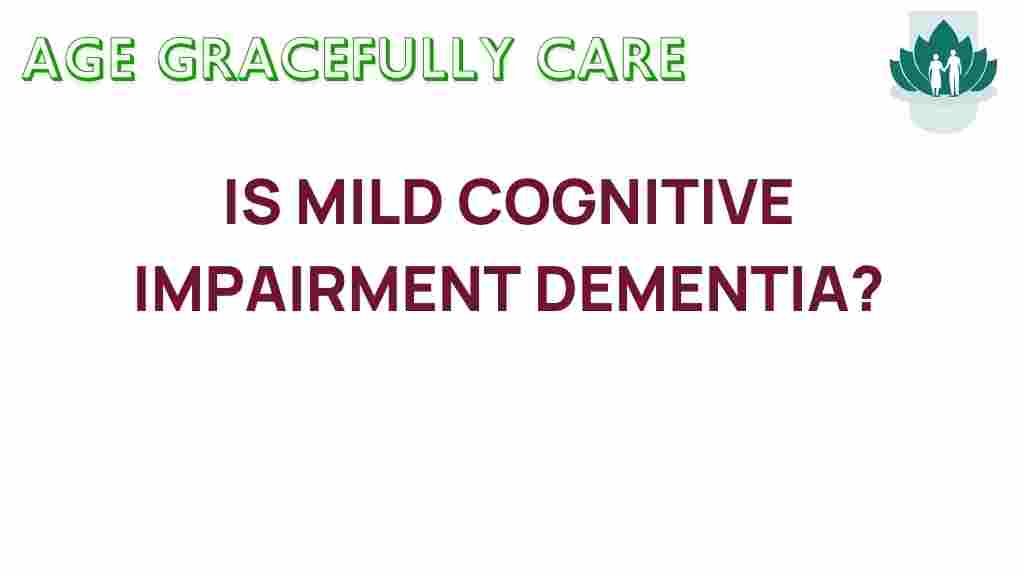Mild Cognitive Impairment: A Precursor to Dementia?
As we age, many individuals experience changes in their cognitive abilities. While some memory loss can be a normal part of aging, others may develop more significant issues that indicate a potential problem. One condition that has garnered attention in recent years is Mild Cognitive Impairment (MCI). This article dives deep into the relationship between MCI and Dementia, exploring whether MCI is indeed a precursor to more serious cognitive decline.
Understanding Mild Cognitive Impairment
Mild Cognitive Impairment is characterized by noticeable but mild changes in cognitive function, which can include:
- Difficulty with memory
- Challenges in problem-solving
- Struggles with attention and focus
- Language issues, such as finding the right words
While these changes may not significantly interfere with daily life, they can be alarming for both the individual and their loved ones. It’s crucial to recognize that MCI does not always lead to Dementia, but it can increase the risk of developing neurodegenerative diseases in the future.
Early Signs of Cognitive Decline
Identifying the early signs of cognitive decline is essential for timely intervention. Some early signs include:
- Frequent forgetfulness, especially of recent events
- Difficulty concentrating on tasks
- Struggling to follow conversations or TV shows
- Misplacing items often
If you or a loved one exhibits these symptoms, it may be time to consult a healthcare professional.
Diagnosing Mild Cognitive Impairment
The diagnosis of MCI typically involves several steps:
1. Comprehensive Medical Assessment
A healthcare provider will conduct a thorough medical history and physical examination to rule out other potential causes of cognitive decline, such as vitamin deficiencies or thyroid problems.
2. Cognitive Testing
Standardized tests measuring memory, attention, and problem-solving skills are administered. These tests help determine the extent of cognitive impairment.
3. Brain Imaging
Brain imaging techniques, such as MRI or CT scans, may be used to identify any structural brain changes or other abnormalities that could explain the symptoms.
4. Ongoing Monitoring
Since MCI can progress to Dementia, ongoing monitoring is essential. Regular follow-ups with healthcare providers can help track changes over time.
The Link Between Mild Cognitive Impairment and Dementia
Research indicates that individuals diagnosed with MCI have an increased risk of developing Dementia. Studies suggest that:
- Approximately 10-15% of individuals with MCI progress to Dementia each year.
- Not all individuals with MCI will develop Dementia; some may remain stable or even improve.
Understanding this relationship is crucial for early intervention and management strategies aimed at maintaining brain health.
Types of Dementia Associated with Mild Cognitive Impairment
Not all forms of Dementia are related to MCI, but several types are commonly associated with it:
- Alzheimer’s Disease: The most common form of Dementia, often beginning with memory loss.
- Vascular Dementia: Resulting from reduced blood flow to the brain, often following strokes.
- Lewy Body Dementia: Characterized by abnormal protein deposits in the brain.
Maintaining Brain Health and Preventing Cognitive Decline
While MCI can be concerning, there are proactive measures individuals can take to support brain health and potentially slow cognitive decline:
1. Healthy Diet
A nutritious diet rich in fruits, vegetables, whole grains, and healthy fats can support overall brain function. The Mediterranean diet, in particular, has been linked to reduced risk of cognitive decline.
2. Regular Exercise
Physical activity increases blood flow to the brain and can promote the growth of new neurons. Aim for at least 150 minutes of moderate aerobic activity each week.
3. Mental Stimulation
Engaging in mentally stimulating activities, such as puzzles, reading, or learning new skills, can help maintain cognitive function.
4. Social Engagement
Staying socially active and connected with others can protect against cognitive decline. Join clubs, volunteer, or maintain close relationships with friends and family.
5. Sleep Hygiene
Quality sleep is essential for cognitive health. Aim for 7-9 hours of uninterrupted sleep each night, and establish a calming bedtime routine.
Troubleshooting Tips for Addressing Memory Loss
If you or someone you know is experiencing memory loss or other cognitive issues, consider these troubleshooting tips:
1. Keep a Journal
Document any instances of forgetfulness or memory issues. This can help identify patterns and provide valuable information to healthcare providers.
2. Use Memory Aids
Utilize tools such as calendars, reminders, and organizational apps to help keep track of important dates and tasks.
3. Stay Organized
Establish designated places for commonly mislaid items and create a clutter-free environment to reduce distractions.
4. Engage in Mental Exercises
Commit to activities that challenge your brain, such as crossword puzzles, Sudoku, or learning a new language.
5. Seek Professional Help
If memory loss persists or worsens, consult a healthcare professional. Early diagnosis and intervention can make a significant difference.
Conclusion: The Importance of Awareness
Understanding Mild Cognitive Impairment and its potential connection to Dementia is crucial for maintaining brain health as we age. While MCI can serve as an early warning sign, not everyone with MCI will progress to Dementia. By recognizing early signs and taking proactive steps to support cognitive function, individuals can better navigate the challenges of aging.
For more information on cognitive decline, visit the Alzheimer’s Association. If you’re looking for local support groups or resources, check out this helpful guide.
Stay informed, stay engaged, and prioritize your cognitive health!
This article is in the category Health and created by AgeGracefullyCare Team
